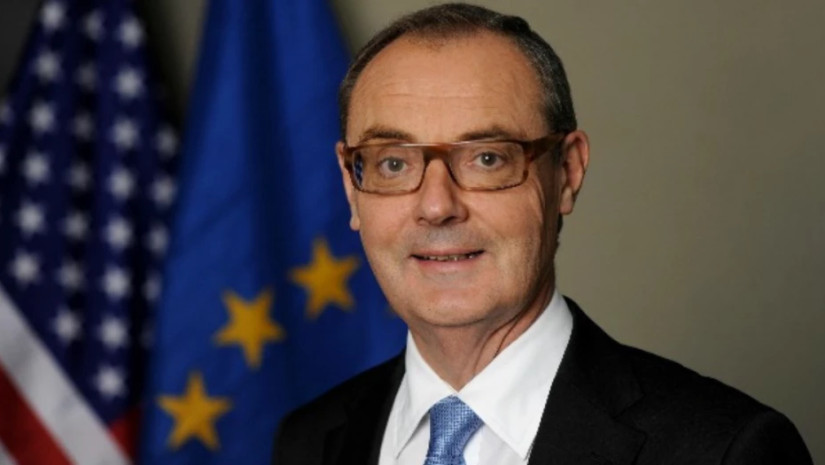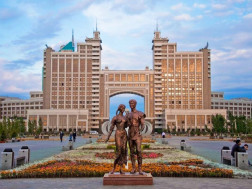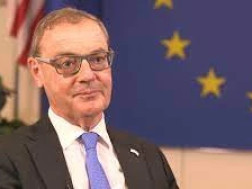David O'Sullivan, the European Union's special envoy for the implementation of sanctions, has called on Kyrgyzstan and other nations in Moscow's political and economic sphere to avoid assisting Moscow's attempts to evade sanctions imposed on Russia over its ongoing full-scale invasion of Ukraine.
Talking to reporters in Bishkek on March 28, O'Sullivan questioned the final destination of many goods imported to Central Asian nations, as well as to Armenia, Georgia, Serbia, and the United Arab Emirates, after data showed a 300 percent increase of goods coming into the area from the EU in recent months.
"The transportation of goods previously exported to Russia from the European Union, but stopped after the sanctions, has increased," he said.
O'Sullivan pointed out that 770 items imported from the EU to other countries had been found in Russian military equipment and weapons used in its war against Ukraine, a clear sign that some nations were being used as transit points for goods to flow into Russia.
He added that he hopes to meet with top officials from Kyrgyzstan to discuss the exporting of goods from the Central Asian nation to other countries to prevent the products from making their way to Russia.
According to RFE/RL's Kyrgyz Service prior to visiting Kyrgyzstan, O'Sullivan visited Turkey, the United Arab Emirates and Pakistan. He also intends to visit Uzbekistan, Kazakhstan, Armenia and Georgia.
Asked about the main purpose of these visits, O'Sullivan said: "For more than a year now, the war in Ukraine, which was unleashed by Russia, has been going on. In this regard, we have introduced unprecedented sanctions that have not been introduced before. Now we will focus on the implementation, application, enforcement of these sanctions in the EU countries themselves. Plus, we need to hold a dialogue, discuss this issue with countries through which, we believe, sanctions can be circumvented. Because lately there has been a large increase in exports from the EU to certain countries of those goods that we previously supplied to Russia and which are not supplied now. The purpose of my visits is to open a dialogue with these countries to determine whether there is a circumvention of sanctions, if so, how to stop it.
As noted by Kyrgyz Service of RFE/RL, earlier O'Sullivan said that "some countries should not become a tool for Russia to circumvent sanctions" and asked official, "if such operations are revealed, what measures will be taken against countries helping Russia to circumvent sanctions?"
In O'Sullivan's words, "first of all, we need to determine how the goods imported from Europe are used here, re-exported to third countries other than Russia, or exported to the Russian Federation. If to Russia, then from our side there will be a request to this or that country to prevent re-export, because Kyrgyzstan and other countries have said that they are neutral and they do not want their territories to be used as a platform to circumvent sanctions."
Since the start of Russia's full-scale aggression against Ukraine, the EU and the United States have sanctioned thousands of entities and individuals, while the U.S. Commerce Department has imposed prohibitive controls on exports to Russia and its ally Belarus.
The United States said earlier this month that Russian companies have evaded the sanctions using intermediaries in China, Armenia, Turkey, Uzbekistan, and the United Arab Emirates.
In April last year, the deputy chief of the presidential office in Kazakhstan, Russia's largest trade partner in Central Asia, said his country will not help Russia evade Western sanctions, but added it will continue its economic ties with Russia within the Eurasian Economic Union, as "there is no way for our economy to do it differently," RFE/RL reports.
















